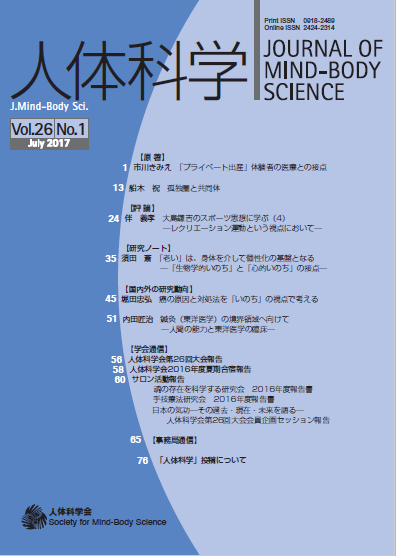Volume 29, Issue 1
Displaying 1-13 of 13 articles from this issue
- |<
- <
- 1
- >
- >|
Cover
-
Article type: Cover
2020 Volume 29 Issue 1 Pages 0-
Published: 2020
Released on J-STAGE: January 19, 2021
Download PDF (167K)
-
2020 Volume 29 Issue 1 Pages 1-10
Published: July 15, 2020
Released on J-STAGE: July 23, 2020
Download PDF (743K) -
2020 Volume 29 Issue 1 Pages 11-21
Published: July 15, 2020
Released on J-STAGE: July 23, 2020
Download PDF (684K)
-
2020 Volume 29 Issue 1 Pages 22-31
Published: July 15, 2020
Released on J-STAGE: July 23, 2020
Download PDF (496K) -
2020 Volume 29 Issue 1 Pages 32-42
Published: July 15, 2020
Released on J-STAGE: July 23, 2020
Download PDF (448K)
-
2020 Volume 29 Issue 1 Pages 43-52
Published: July 15, 2020
Released on J-STAGE: July 23, 2020
Download PDF (537K)
SMBS Information
-
Article type: SMBS Information
2020 Volume 29 Issue 1 Pages 1053-
Published: 2020
Released on J-STAGE: January 19, 2021
Download PDF (119K)
-
2020 Volume 29 Issue 1 Pages 53-
Published: 2020
Released on J-STAGE: August 30, 2020
Download PDF (219K) -
2020 Volume 29 Issue 1 Pages 54-56
Published: 2020
Released on J-STAGE: August 30, 2020
Download PDF (822K) -
2020 Volume 29 Issue 1 Pages 57-
Published: 2020
Released on J-STAGE: August 30, 2020
Download PDF (220K) -
2020 Volume 29 Issue 1 Pages 58-60
Published: 2020
Released on J-STAGE: August 30, 2020
Download PDF (861K) -
2020 Volume 29 Issue 1 Pages 61-
Published: 2020
Released on J-STAGE: August 30, 2020
Download PDF (799K)
Copyright
-
Article type: Copyright
2020 Volume 29 Issue 1 Pages 1055-
Published: 2020
Released on J-STAGE: January 19, 2021
Download PDF (45K)
- |<
- <
- 1
- >
- >|
